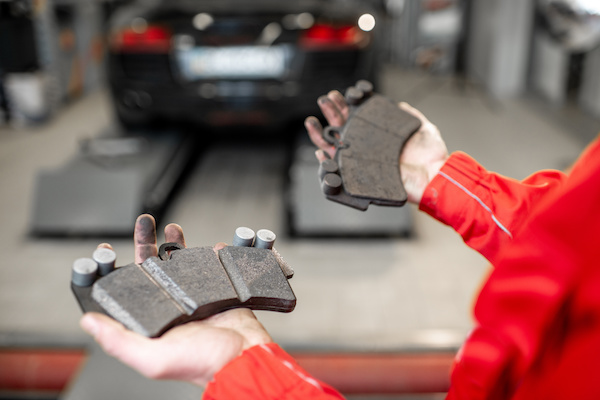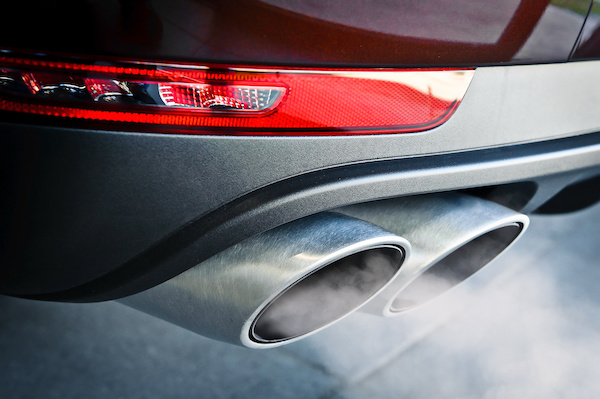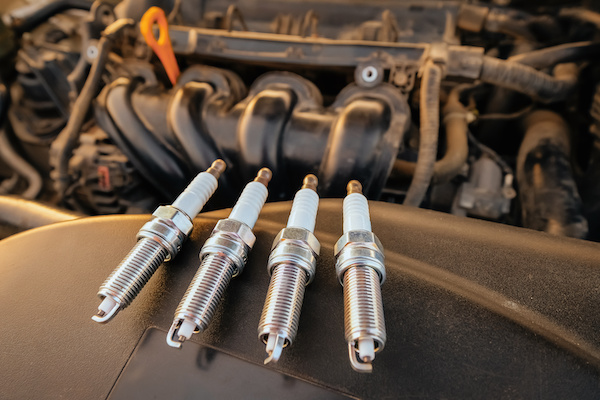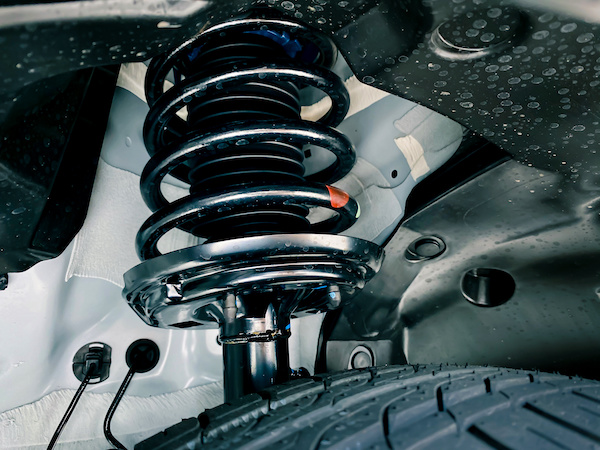Posted on 12/30/2022

A vehicle's braking system is a complex collection of parts, including brake pads. Brake pads are essential to stopping your car as they are the part connected to the wheels. After some inspection, you may notice uneven wear and tear on your brake pads. It is natural for front and back brake pads to have uneven damage since the front ones are responsible for braking. The following are possible causes of uneven brake pad wear: Caliper Failure Caliper failure is the most common cause of uneven brake pad wear and tear. The calipers have a piston that puts pressure on the brake pads to stop the car. When you release the brake pad, a seal in the caliper retracts the piston away from the brake pad. The seal is made of rubber and loses its ability to pull the piston back with time. The calipers can also get stuck, causing one brake rotor to exact more pressure on a brake pad than the others. Brake Rotor Damage Brake rotors can deteriorate unevenly, leading to Disc Thickness Variation ... read more
Posted on 11/30/2022

The exhaust system comprises many pipes that carry gasses away from the engine to the outside of your car. Before the engine byproducts are released into the atmosphere, the exhaust also changes the gasses to make them less harmful; and contribute less to pollution. When your exhaust works the way it should, your engine will most likely run well and efficiently. The main components of the vehicle’s exhaust system include the manifold, sensors, catalytic converter, resonator, muffler, and tailpipe. When one of these isn’t doing what they are supposed to, it can put you and your engine in danger. Here are some signs that indicate you may have an exhaust problem on your hands: The unusual smell of gasses inside the vehicle cabin Increased fuel consumption Loud engine noises, especially during acceleration Decreased engine performance Common Exhaust Problems Rust Since most of the parts we mentioned above are made of metals, rust is the number one enemy of your exhaust ... read more
Posted on 10/31/2022

Spark plugs are essential in a vehicle's combustion engine as they influence everything, including gas mileage and acceleration. This means for your vehicle's engine to perform well; it has to be appropriately maintained. So, how often should you change your spark plugs? What happens if you don't replace spark plugs in time? This article includes a step to step guide on how to change your vehicle's spark plugs. Timely replacement This is a general answer on how often you should change the spark plugs in your vehicle. That's because the answers you seek are in your vehicle owner's manual. In the manual, you will get the replacement interval recommended by your manufacturer. Generally, a vehicle's spark plugs need replacement after every 30,000 miles. But, if you don't replace the plugs on time, you increase the chances of causing engine problems like uneven idling, improper acceleration, and misfiring. Also, if you don't replace the old spark plugs ... read more
Posted on 9/29/2022

When you drive over a speed bump or potholes, you probably count your lucky stars that your car didn't get "totaled". This is possible because of the shocks and struts in your vehicle are doing exactly what they're supposed to do. What's the difference between the two? Let's find out. Are they the same? Both parts help the car from not absorbing as much impact, but they are two different parts. Struts are shock absorbers for your vehicle suspension system. They limit the vertical travel or motion when the vehicle run over something on the road. Shocks is an independent component that helps the strut absorb the impact on whatever object that is on the road that you may strike. Now that you know what both parts do, let's explore what kind of shock absorbers there are! Three types of Shock Absorbers Mono-tube Shock Absorbers This shock absorber is the most common one that's used in a vehicle. This is because it makes sure that you have a smooth tr ... read more
Posted on 8/30/2022
.jpeg)
Radiator flush might sound like a punch line but for cars it is a tune-up fundamental. Radiator fluid, also called antifreeze or coolant, keeps your car's radiator cool, especially during warm weather. This prevents the engine from overheating which will literally stall your plans. Because coolant is a fluid that runs constantly through the engine system it will collect debris and contaminants over time which can generate corrosion, causing rust, scaling and other types of debris that you don't want in your engine's radiator. A radiator flush acts almost like a blood transfusion, but designed for the cooling system. By blasting gallons of water, cleaner and fresh antifreeze during the flush, all of the contaminants and old fluids are cleared out. Another benefit to a radiator flush is the removal of rust and scaling that has built up on the radiator from debris and old fluids. A flush will also help to lubricate your water pump which will make it last longer. It will al ... read more